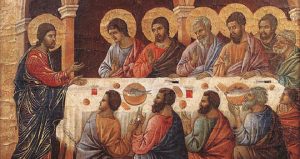 Luke and Matthew relate the same story heard in this gospel from Mark. With Luke, you realize, it was hearsay … he was not there to give an eye-witness account. It’s interesting to see the minor, but specific differences in the three accounts. For example, where Mark says, “take no money,” Matthew specifies, “take no silver, gold or copper coins.” He was covering all the bases, not just the currency in current use. He notes other details that let you know he was there and must have been a high sensate on the Myers-Briggs scale. He begins the story with Jesus reminding the disciple-missionaries: “You received without paying, so now give without being paid.” Where Mark says, “whatever house you enter,” Matthew is more aggressive: “Look for someone to welcome you.” And, if when you wish them peace and it is not returned, “take back your greeting.” Both Luke and Matthew, in the list of what not to take on their journey, quote Jesus saying: “take no beggar’s bag.” They were to live dependent on the hospitality of the community, just as Jesus depended on others to provide for his needs. Remember what he told one of his potential followers – “Foxes have dens and birds have nests, but the Son of Man has no place to lay his head.” Jesus expected his disciples to “eat what is served, be satisfied with the bedding provided, follow their schedule, and don’t try to go it alone.” Remind you of Benedict’s norms?
Luke and Matthew relate the same story heard in this gospel from Mark. With Luke, you realize, it was hearsay … he was not there to give an eye-witness account. It’s interesting to see the minor, but specific differences in the three accounts. For example, where Mark says, “take no money,” Matthew specifies, “take no silver, gold or copper coins.” He was covering all the bases, not just the currency in current use. He notes other details that let you know he was there and must have been a high sensate on the Myers-Briggs scale. He begins the story with Jesus reminding the disciple-missionaries: “You received without paying, so now give without being paid.” Where Mark says, “whatever house you enter,” Matthew is more aggressive: “Look for someone to welcome you.” And, if when you wish them peace and it is not returned, “take back your greeting.” Both Luke and Matthew, in the list of what not to take on their journey, quote Jesus saying: “take no beggar’s bag.” They were to live dependent on the hospitality of the community, just as Jesus depended on others to provide for his needs. Remember what he told one of his potential followers – “Foxes have dens and birds have nests, but the Son of Man has no place to lay his head.” Jesus expected his disciples to “eat what is served, be satisfied with the bedding provided, follow their schedule, and don’t try to go it alone.” Remind you of Benedict’s norms?
But, that’s enough about what NOT to take on your life’s journey. Let’s look at what Jesus says is appropriate for our journey in order to carry on the mission of Jesus.
The first thing Jesus recommends that we travel two by two – life is not a solo venture. He is reminding us not to try to go it alone. We need a good support system as we experience life’s ups and downs. Sharing the good times is as important as it is to share the not so great times. Benedict recommends the same when, in the first chapter of the Rule, he describes the kinds of monks: “First, there are the cenobites, those who belong to a (community) a monastery.” Jesus sent the twelve in pairs not only for safety but for companionship, encouragement and help.
Remember that God is always with us, so we are never really alone. But Jesus acknowledges that just as he is a member of the trinity, so we humans, social creatures made in God’s likeness draw life from companionship.
Jesus recommends sandals for our feet and a tunic, but not a second one. Jesus asks us not to carry so much. Take off that extra tunic – the worries that we carry can bring us down. Stuffing them in our gunny sacks does nothing to change the situation – just adds wrinkles to our brow and sours our spirit. Do what Jesus says: “shake the dust off your feet” and don’t look back and wonder what might have been, or might you have done.
Jesus asks us to carry and use a walking stick, so we can keep moving when we encounter ruts and pebbles in the road or to hold us up when we became worn out, tired and weary. Maybe we even wander off the edge of the road until we hear the sound from the rumble strips. A good walking stick helps us stay upright and get past mistakes which could hinder our spiritual growth and practice of conversio. And, beyond that, it’s a fact that in order to do what we say in our Corporate Commitment (that is) “to meet the hungers of the people of God with the compassion of Christ” we must first be compassionate with ourselves.
 Today Jesus sends us out again, with authority over unclean spirits … over the rancor, the violence, the rudeness, the degrading language and actions, the insensitivity … the list can go on and on … we can conquer the darkness with a refusal to lower our behavior, language and standards. We can “shake that dust from our feet” and support actions on behalf of justice and peace because we are traveling “two by two,” with the sturdy walking stick of community and prayer, and wearing the sandals of our vows. Like the disciples, we heed Jesus’ admonition to stay put in the house where they took us in, we can anoint others with inclusivity and peace. Pray God we stay the course…
Today Jesus sends us out again, with authority over unclean spirits … over the rancor, the violence, the rudeness, the degrading language and actions, the insensitivity … the list can go on and on … we can conquer the darkness with a refusal to lower our behavior, language and standards. We can “shake that dust from our feet” and support actions on behalf of justice and peace because we are traveling “two by two,” with the sturdy walking stick of community and prayer, and wearing the sandals of our vows. Like the disciples, we heed Jesus’ admonition to stay put in the house where they took us in, we can anoint others with inclusivity and peace. Pray God we stay the course…






